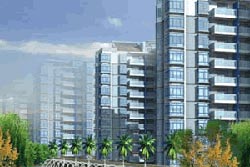
Ever-increasing property prices in China suggest the government’s macro-control measures might be failing to squeeze out speculative bubbles in the overheated real estate sector.
According to the National Bureau of Statistics (NBS), average property prices rose 13 percent during the first nine months of this year compared to a year ago, and prices for residential housing in the same period rose 10.9 percent year-on-year.
Zhang Xueying, a senior economist with the State Information Center, said prices are beyond the reach of most, despite the government’s clamp down on credit and the introduction of measures to cool investment.
Prices for residential housing in Beijing are between 7,000 yuan (US$843.4) and 8,000 yuan (US$963.9) per square meter, but the average annual income of residents is only about 10,000 yuan (US$1,204.8). “If this isn’t a bubble, who is buying this housing?” asked Zhang.
Yi Xianrong, a senior economist with the Chinese Academy of Social Sciences, said the government’s controls have had little impact on the real estate sector, which he sees as the root of the country’s overheated economy. If the government does not deal properly with the issue, it will be taking a huge risk.
The NBS says that property investment reached 835.7 billion yuan (US$100.7 billion) during the first nine months of 2004, an increase of 28.3 percent on a year ago. Investment in residential housing reached 568.4 billion yuan (US$68.5 billion) during the same period, an increase of 27.4 percent.
NBS spokesman Zheng Jingping said last week the current higher prices were largely a result of solid demand, rising costs of building materials and a move by the government to limit land for developers. “But we cannot rule out speculative factors,” he said, adding that the government should pay close attention to trends and prevent prices from rising too rapidly to prevent a bubble.
Zhang Liqun, a senior researcher with the State Council’s Development Research Center, said China’s real estate sector, if developed soundly, could be a strong propeller for the country’s economic development. Strong demand for housing, a major feature of current consumption patterns, would not be short-term, he said.
An average urban family had 223,000 yuan (US$26,867) worth of total assets in 2002, of which 78,000 yuan (US$9,398) were financial. About 40 percent of the 140 million urban families owned financial assets worth more than 150,000 yuan (US$18,072) each.
“These families have played, and will continue to play, an important role in China’s housing market,” said Zhang.
Turning to China’s rural populace, Zhang remarked: “These people will demand a large number of homes during the country’s urbanization process.” Based on the experience of developed countries this trend is likely to last for several decades, he continued. “China’s future housing consumption expansion has solid financial supports. People’s income will grow at a stable rate, along with the country’s sound economic development.”
(China Daily October 27, 2004)
|

